
III Corps is a corps of the United States Army headquartered at Fort Hood, Texas. It is a major formation of the United States Army Forces Command.

Desertion is the abandonment of a military duty or post without permission and is done with the intention of not returning. This contrasts with unauthorized absence (UA) or absence without leave, which are temporary forms of absence.
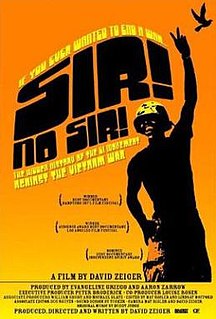
Sir! No Sir! is a 2005 documentary by Displaced Films about the anti-war movement within the ranks of the United States Armed Forces during the Vietnam War. The film was produced, directed, and written by David Zeiger. The film had a theatrical run in 80 cities throughout the U.S. and Canada in 2006, and was broadcast worldwide on: Sundance Channel, Discovery Channel, BBC, ARTE France, ABC Australia, SBC Spain, ZDF Germany, YLE Finland, RT, and several others.
Tod Ensign was an American veterans' rights lawyer and Director of Citizen Soldier, a non-profit GI and veterans rights advocacy group based in New York City. Ensign held two law degrees, a Master of Laws (LLM) from NYU and Juris Doctor (J.D.) from Wayne State University, as well as a BA from Michigan State University.

The Carl R. Darnall Army Medical Center is a medical center for the US Army at Fort Hood, Texas. It provides medical care to active duty soldiers and their families along with Army veterans and their families. The center was named after Brig. Gen. Carl Rogers Darnall, MD.
David Cline was an American anti-war and veterans rights activist. He was best known as National President of Veterans For Peace (VFP) from 2000 to 2006, Chapter Vice President of Alan Reilly - Gene Glazer VFP Chapter 21, and co-founder of the Vietnam Agent Orange Relief and Responsibility Campaign. Cline was featured in the 2006 film Sir! No Sir!, which documented the GI antiwar movement during the Vietnam war as well as in the book "Winter Soldiers: An Oral History of Vietnam Veterans Against the War" by Richard Stacewicz.

The 89th Military Police Brigade is a military police brigade of the United States Army based at Fort Hood, Texas. It is a subordinate unit of III Corps.
The Shelter Half was a GI Coffeehouse in Tacoma, Washington that operated at 5437 South Tacoma Way. from 1968 to 1974. Named after a military tent called a Shelter-half, the coffeehouse's purpose was to provide a place for GIs at Fort Lewis military base in Washington State to resist the war in Vietnam. The Shelter Half served as an anti-war headquarters, publishing underground anti-war newspapers, organizing boycotts, connecting civilian activists with local GIs, and leading peace marches.
Selena Danielle Coppa is an ex-military intelligence Sergeant in the United States Army. She is primarily notable for her organizing and activism against the US Occupation of Iraq while serving as an active duty military member, including serving on the Executive Board of Iraq Veterans Against the War. In 2009 it was announced that she was heading a committee responsible for gaining and training more active duty anti-war soldiers. She has the somewhat unusual status of being a war resister strictly holding to legalities, and has been identified as a primary "force multiplier" for other servicemembers attempting to resist the war through legal means.
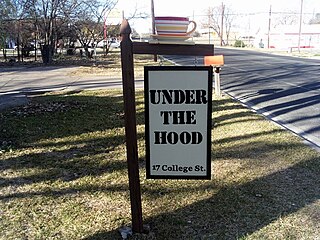
Under the Hood Café was a coffee house located at 17 South College Street in Killeen, Texas. It provided services for soldiers located at Fort Hood, one of the largest American military installation in the world. Under the Hood Café was first managed by Cynthia Thomas,
Coffee Strong is a GI coffeehouse based on the tradition of resistance coffee houses opened during the Vietnam War by antiwar veterans and active duty soldiers. Based in Lakewood, WA it was founded in 2008 by veterans returning from the wars in Afghanistan and Iraq. It is located within 300 meters of the gates at Joint Base Lewis-McChord. It is one of three currently active GI resistance coffee houses along with Under the Hood Café near Fort Hood in Texas & Norfolk Offbase in Norfolk, Virginia. According to Coffee Strong board member Zoltan Grossman
The goal of the G.I. coffeehouse is to provide soldiers, their families and recent vets a place away from the base where they can learn about resources available to them, meet with G.I. rights counselors, and access alternative information. It holds weekly movie nights, and hosts speakers, hiphop, punk and folk concerts, and other events. The response from soldiers visiting the coffeehouse has so far been overwhelmingly positive.

Naser Jason Abdo is an American former US Army Private First Class who was arrested July 28, 2011, near Fort Hood, Texas, and was held without bond for possession of an unregistered firearm and allegedly planning to attack a restaurant frequented by soldiers from the base. He was convicted in federal court on May 24, 2012, of attempted use of a weapon of mass destruction, attempted murder of federal employees, and weapons charges. He was sentenced on August 10, 2012, to two consecutive sentences of life in prison, plus 60 years.

The Concerned Officers Movement (COM) was an organization of mainly junior officers formed within the U.S. military in the early 1970s whose principal purpose was opposition to the U.S. involvement in the Vietnam War. Very quickly, however, it also found itself fighting for First Amendment rights within the military. It was initiated in the Washington, D.C. area by commissioned officers who were also Vietnam Veterans, but rapidly expanded throughout all branches and many bases of the U.S. military, ultimately playing an influential role in the opposition to the Vietnam War.
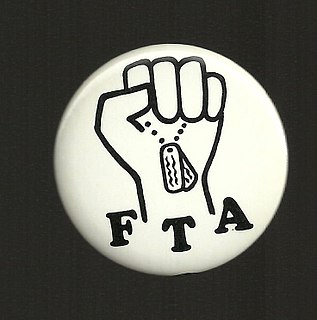
The Movement for a Democratic Military (MDM) was an antiwar and GI rights organization during the Vietnam War. Initially formed in late 1969 as a merger of sailors from San Diego and marines from the Camp Pendleton Marine Base in Oceanside, CA, it rapidly spread to a number of other cities and bases in California and the mid-West, including San Francisco, Long Beach Naval Station, El Toro Marine Air Station, Fort Ord, Fort Carson and the Great Lakes Naval Training Center. Heavily influenced by the Black Panther Party and the Black militancy of the times., it became one of the more radical GI organizations during that era and was investigated in 1971 by the House Committee on Internal Security. As with much of the GI movement during this era, chapters had a high turnover as members were transferred, discharged and disciplined by the military. By late 1970 several chapters had splintered or disbanded, but the group's name and demands proved popular within the GI resistance movement overall. Some chapters continued through 1971 and 1972 and one until 1975.

GI Coffeehouses were a consequential part of the anti-war movement during the Vietnam War era, particularly the resistance to the war within the U.S. military. They were mainly organized by civilian anti-war activists as a method of supporting antiwar and anti-military sentiment among GIs, but many GIs participated as well. They were created in numerous cities and towns near U.S. military bases throughout the U.S as well as Germany and Japan. Due to the normal high turnover rate of GIs at military bases plus the military's response which often involved transfer, discharge and demotion, not to mention the hostility of the pro-military towns where many coffeehouses were located, most of them were short-lived, but a few survived for several years and "contributed to some of the GI movement's most significant actions". The first GI coffeehouse of the Vietnam era was set up in January 1968 and the last closed in 1974. There have been a few additional coffeehouses created during the U.S. led wars in Iraq and Afghanistan.

Courage to Resist (CTR) is an organization in the San Francisco, CA area and beyond formed during the early part of the Iraq War which began in 2003. CTR's mission is to support U.S military war resisters, including helping them with legal fees such as well-known resisters Chelsea Manning and Reality Winner. In 2018, CTR began encouraging soldiers to resist at detention camps and other immigrant operations of the U.S. military. CTR's principle slogans are “Supporting the troops who refuse to fight!” and "Towards a World Without War!" They support those “who face consequences for acting on conscience, in opposition to illegal wars, occupations, [and] the policies of empire”.

Waging Peace in Vietnam: U.S. Soldiers and Veterans Who Opposed the War is a non-fiction book edited by Ron Carver, David Cortright, and Barbara Doherty. It was published in September 2019 by New Village Press and is distributed by New York University Press.
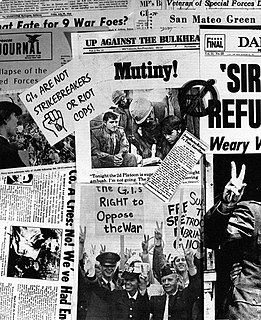
The term G.I. movement refers to resistance to military involvement in the Vietnam War from active duty soldiers in the United States military. Within the military popular forms of resistance included combat refusals, fragging, and desertion. By the end of the war at least 600 officers were killed in fraggings, over 300 refused to combat and approximately 50,000 American servicemen deserted. Along with resistance inside the U.S. military, civilians opened up various GI Coffeehouses near military bases where civilians could meet with soldiers and could discuss and cooperate in the anti-war movement.
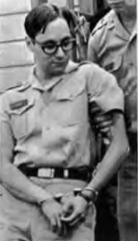
The court-martial of Howard Levy occurred in 1967. Howard Levy was a United States Army doctor who became an early resister to the Vietnam War. In 1967, he was court-martialed at Fort Jackson, South Carolina, for refusing an order to train Green Beret medics on their way to Vietnam. He said it "became clear to me that the Army [was using medics] to 'win hearts and minds' in Vietnamese villages - while still burning them to the ground in search-and-destroy missions." He considered the Special Forces "killers of peasants and murderers of women and children".

The court-martial of Lieutenant Susan Schnall, a U.S. Navy nurse stationed at the Oakland Naval Hospital in Oakland, California, took place in early 1969. Her political activities, which led to the military trial, may have garnered some of the most provocative news coverage during the early days of the U.S. antiwar movement against the Vietnam War. In October 1968, the San Francisco Chronicle called her the “Peace Leaflet Bomber” for raining tens of thousands of antiwar leaflets from a small airplane over several San Francisco Bay Area military installations and the deck of an aircraft carrier. The day after this “bombing” run, she marched in her officer’s uniform at the front of a large antiwar demonstration, knowing it was against military regulations. While the Navy was court-martialing her for “conduct unbecoming an officer” she was publicly telling the press “As far as I’m concerned, it’s conduct unbecoming to officers to send men to die in Vietnam.”















